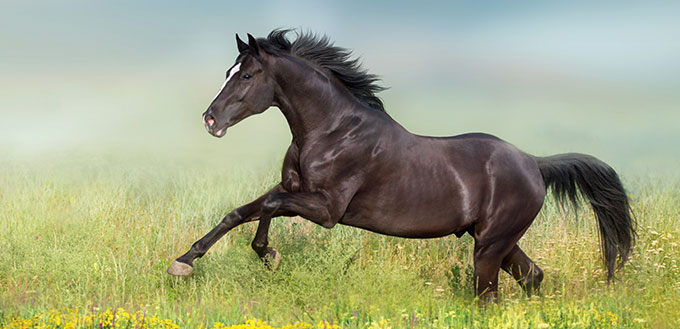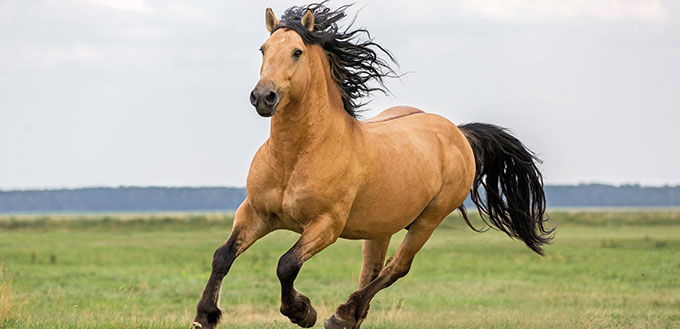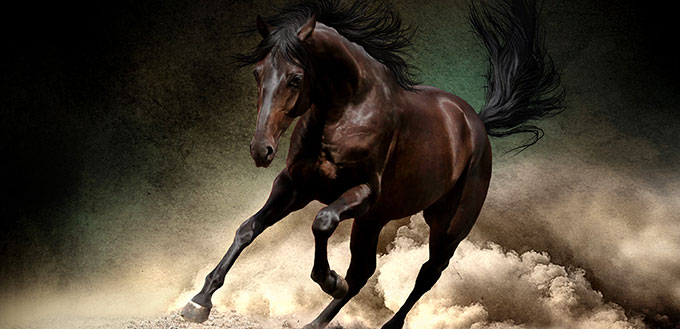Horses are some of the most majestic and stunning creatures to grace our planet. They have the strength to carry humans on their back and still bound across fields at full speed. They’re social, communicative, and intelligent. Today, our question to unfold is: How long can a horse run?
In the following sections, we hope to showcase the absolute powerhouse of an animal that is the noble horse.

How Far Can a Horse Run
The gallop, which is the fastest pace that a horse is known to take, would be the quickest way for any horse to travel. During a gallop, all four of the horse’s hooves will come off of the floor together and then return to the floor in the same way.
This is why there are so many amazing photographs of horses galloping across fields or tracks; when all four of their hooves leave the ground like that, images can be timed to make a horse look like they’re flying or floating above the ground.
When you gallop a horse, they have the ability to travel an average of 2.5 miles of ground during each session of galloping. They could, in theory, travel further, but it isn’t very healthy for them to be pushed like this – you could end up with an injured horse.
Unlike galloping, in a horse trot, the horse will not top out at 2.5 miles. As such, galloping will not help you with the question “how long can a horse run?” Horses have a steadier trotting pace and can continue in trot for anywhere from 20 to 30 miles if they are fit, well, and generally healthy.
A horse being asked to travel this kind of distance in one day should be awarded plenty of breaks, and their rider should be skilled and experienced enough to recognize when their horse needs to stop for the day.
It’s interesting to look at the different travel averages for the speed of a horse. For example, at a walk, a standard trail horse could hit 50 miles in one day. That’s very different to the short 2.5-mile bursts of a gallop. A slower walk is certainly the way forward for long journeys.
Breeds and Their Abilities
Not all breeds are the same. When you’re considering the question “how long can a horse run?”, you’re generalizing all horses as one. You wouldn’t expect a domestic pony with short legs to be able to keep up with the muscles of a stallion taking huge strides, for example.
If a rider is planning on taking their horse out on a number of long excursions, they should be paired with a breed that is known for being able to travel long distance without a couple of miles per hour injuring the horse. Fatigue is the enemy of any horse and their rider. So is dehydration!
Rather than breaking out unsuitable horses for your next race or long-distance endurance trip, try one of the breeds we’ve listed below. These horses are bred for their stamina; able to run across stretches of different terrain, pushing their stamina like they’re in a race with themselves.
You may also like our article on the Best Horse Breeds.
American Quarter Horse
With speeds that reach up to 55 miles per hour, the American Quarter Horse has better sprinting ability than many other horse breeds. Their sprint range is even better than Thoroughbreds, which makes them perfect for races.
This United States breed originated from English and Spanish horses, which created a muscular horse in a compact form.
Arabian
Arabians hold the record for being the breed that can cross a distance that no other horse can meet. They are seemingly untouchable horses with no limits, packed full of speed and ability.
The fact is, these are a well-tempered breed, and have been bred so much over the years that you’d be hard-pressed to find another horse breed that isn’t at least one percent Arabian.
Kentucky Natural Gated Horse
This breed of horse can travel far! The Kentucky Natural Gated horse breed is a very intelligent horse with a skillful mind and a lot of stamina.
They aren’t your average lot of endurance horses, Kentucky horses are efficient with their movements, yet extremely calm. Unlike a lot of the hot blood in other stamina-based horses, Kentucky horses are big, soft-hearted animals.
Mustang
Not an animal you can ignore, the Mustang horse type can be found both wild and domesticated. They roam the landscape of the Western United States, while also being used in competitions and cross-country horse-riding.
These horses can run, that’s for sure. One stamina-ridden mustang’s fastest time was 54 miles per hour.
A horse like a mustang could, potentially, run 100 miles in 24 hours with properly scheduled breaks.
Rocky Mountain Horse
Another horse for endurance rides, Rocky Mountain horses have been around since 1980. This type of horse can cover an easy one hundred miles in a day if they’re paced correctly.
This animal has effort to spare. The Rocky Mountain horse are the best breed for training to be a working or trail horse. With decent training, they work well in endurance events, too.
Thoroughbred
Competitive, rough around the edges, and full of fire, the Thoroughbred horse can run a distance of over 40 miles per hour. They shouldn’t, but they can.
This breed is a mixture of Arabian, Barb, and Turkoman horses. Their beauty has caught the attention of many horse-lovers, as well any horse owner in the general area.

How a Rider Affects their Horse
The influence of the rider is much greater than they may have you believe. A horse may be intelligent and have the capacity to think for themselves, but they will have also been trained to listen to their rider. It’s a partnership.
When a person and their horse have that understanding, their horse can speed along whatever distances are asked of them, running miles in one burst of energy. A horse will grow with their rider and their trainer. They can be molded into any desired shape if the trainer puts in the work with their runners.
Some of the major impacts a person can have on their horse revolve around their own weight and posture. Not every horse can carry the same load, and all will have a weight they’re comfortable with carrying. A good rule to remember is that a horse should have no problem carrying someone who is 20% or less of their own body weight.
It doesn’t stop at weight, though. For your horse to be able to travel distances with you on their back, you need to be balanced, too.
You should ensure that you are correctly positioned before kicking off with your horse. They won’t thank you halfway down the trail ride if your leg is in the wrong place and giving them mixed signals.
Health Conditions in Overworked Horses
Horses who aren’t in good shape could have some serious underlying conditions. There are several common health conditions in horses, some of which cause heart problems.
It’s a fact that horses can be easily overworked, which can lead to them having weight loss, fatigue, being dehydrated, damaging their ligaments and/or tendons, and more.
We won’t list every common horse health issue here, but just enough to clue you in on these animals and the type of aches and pains they can easily get when they aren’t being given a healthy pace to move at.
Arthritis
One of the most common health problems in horses is arthritis. There’s no cure once a horse gets it, but you can prevent it by warming up before your horses run, and remembering to give them time to cool down.
Laminitis
Laminitis is another common condition that affects the hooves and increases heart rate. It can cause a lot of pain, so you should care for your horse and invest in performance boots if you notice any laminitis conditions.
Dental Issues
The nutrition you give your horse is important, but beyond putting food into their mouths, have you thought much about that area? Horse teeth don’t wear down evenly, and should be getting yearly checks as adults.
Back Issues
Think about how much strain your horse’s back must go through. They carry entire people, perform jumps, gallop, and are moving unless they’re eating or sleeping. The facts are this: horses that perform often experience back issues, and carrying weight in one place for long periods of time isn’t healthy.
Spotting an Overworked Horse
Overworking horses is a rookie mistake, but it’s also one of the most common mistakes to make.
Past the issues of dehydration and not giving your horse enough walk breaks or water, there are other ways to spot when you’re pushing too hard.
If you see any of these symptoms in your horse, consult their vet:
- Weight loss
- Fatigue
- Overheating
- Elevated vital signs
- Listlessness
- Stiff/sore muscles
- Excessive blowing after a workout
- Lack of coordination
- Slow pace and stride
- Lack of appetite

FAQs:
Q: How long can you ride a horse at full gallop?
A: Riding a horse at full gallop is not sustainable. A fit and healthy horse may be able to handle up to 2.5 miles in gallop, which they will cover fairly quickly.
To give you an idea of that as time, it takes a horse approximately 96 seconds to run one mile in gallop.
Q: What happens when a horse runs too long?
A: A horse that runs past their point of exhaustion for a long period of time will be putting undue amounts of pressure on their cardiovascular system and their respiratory system.
A horse that is allowed or forced to run too long by the person riding them may experience a stroke, a heart attack, and/or respiratory failure. It can be fatal.
Q: Will a horse run until its heart explodes?
A: A question built on the back of stories about jockeys pushing their horses to the point of collapse, it is possible for a horse’s head to explode if they run too hard for too long. A horse under the control of its rider is completely at their whim.
When a horse collapses in a race, it’s on the rider, never the horse.
Q: How long would it take to ride a horse 3000 miles?
A: Ignoring the top travel distance for galloping or trotting, let’s assume that you’re keeping a nice, steady pace for the purposes of this question.
It would take a minimum of 60 days to ride your horse 3000 miles, with the potential of up to 20 more days, depending on complications, stop length, and what kind of land you’re travelling on.
Source:
- How Strong Is a Horse?, Wonderopolis







